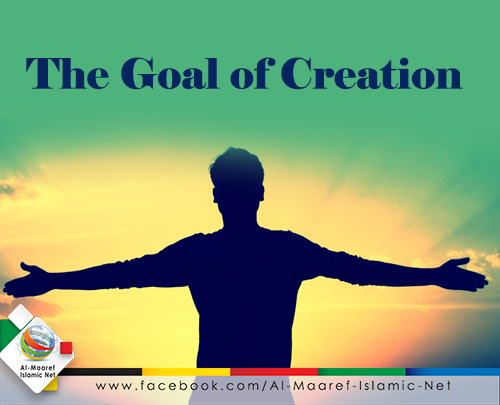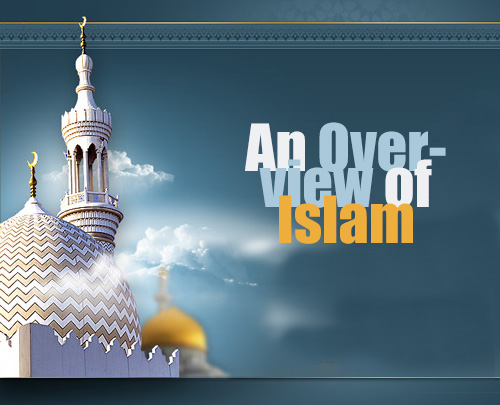What is Islam?
Islam1 means ﴾submitting or surrendering one's will to the will of God (Allah)﴿2
The human beings' innate disposition naturally submits to the reverence of God; this natural feeling was infused with him or her on the day of creation. In reality, the entire universe, through its ordered workings all submit to the will of God. Modern science calls these phenomena “the laws of nature,” but these laws of nature, from an Islamic perspective, are not just any set of laws, rather, they are the laws of God for nature. Human beings depend on, and are in need of God's sustenance and guidance throughout their entire lives; thus, the human being must yield his self-will and desires to the will of the Creator.
Submission to God does not entail self-humiliation or a denial of human intellect; rather, it means trusting the knowledge, wisdom, and fairness of the Creator. In some form of an act or instance, people involuntarily trust and depend on the safety of their lives to others. Hence, the decision to trust a person with more knowledge is logical; therefore, trusting the wisdom of God does not constitute abandoning one's intellect, but rather, it constitutes following one's natural inclination.
The word Islam has other meanings, one of which is “to have peace.” God says in the Quran,3 ﴾He is Allah, there is no god but Him - the King, the Holy One, and the Peace.﴿ (59:23) Moreover, the Quran states, ﴾And Allah invites to the abode of peace.﴿ (10:25)
By its connotations of peace and safety, the word Islam indicates that the religion is free from any deficiencies or defects. As a religion, Islam is considered perfect because it was ordained by God and not invented or marketed by mankind: ﴾This day have I perfected your religion for you, completed My favor upon you, and have chosen for you Islam as your religion.﴿ (5:3)
Commanded by God, Prophet Abraham was the first person to use the words Islam and Muslim,4 ﴾It [the teachings of monotheism of Islam] is the religion of your father Abraham. He [God] has named you Muslims both before and in this [Quran].﴿ (22:78) In another passage of the Quran we read, ﴾Abraham was neither a Jew nor a Christian, but he was a true Muslim [submissive to God] and was not one of the polytheists.﴿ (3:67) Not only did Prophet Abraham call his religion Islam, but the prophets after Abraham also called their religion Islam. Prophet Joseph,[5] in the chapter entitled “Joseph” in the Quran states, ﴾My Lord! You have given me authority and taught me the interpretation of things. O Creator of the heavens and earth! You are my guardian in this world and in the Hereafter. Cause me to die as a Muslim, submitting to Your will, and join me with the righteous.﴿ (12:101)
Thus, God declares in the Quran, ﴾Truly the religion before Allah is Islam.﴿ (3:19)
Who are the Muslims?Who are the Muslims?
Muslims are the followers of the religion of Islam (those who submit to the will of God as explained in the Quran and the traditions of Prophet Muhammad, the Messenger of Islam).
Today, the Muslim population is over a billion and it is spread over a vast range of races, nationalities, and cultures. Approximately 18% of the Muslims live in the Arab world, while the majority live in Asia and Africa. The largest Muslim population is in Indonesia, and a significant number of Muslim minorities exist in Russia, China, Europe, North America, and South America. The Muslim population in the United States is estimated to be around six million.
How Does One Become a Muslim?
The basic requirement to become a Muslim is to declare, ”Ashhadu an laa ilaaha illa Allah, wa ashhadu anna Muhammadan rasul Allah.” In English this means, “I testify that there is no god but Allah, and that Muhammad is the Messenger of God.”
Anyone who proclaims this phrase joins the ranks of the Muslim nation (ummah). This statement marks the beginning of one's physical and spiritual journey in practicing the aspects of Islam. A Muslim strives to become one who the Quran terms as the faithful (mu’min). Although this journey in becoming 'faithful' may be long, its rewards are numerous for those who embark on it with sincere will and intention.
Practicing Islam requires learning Islamic ideas, teachings, and practices, then adhering to them. Moreover, Islamic practice requires some sacrifice. However, the necessity of sacrifice should not be a deterrent. Prophet Muhammad states, “Whenever someone gives up something for the sake of God, God will replace it with something better.”
Sincerity of belief also develops over time. When Prophet Muhammad began spreading the message of Islam, some people came to him and informed him that they were believers in Islam. In reply, God revealed the following verse, ﴾Say [Muhammad to them]: 'You believe not,' but say, 'We have submitted to Islam,' for faith has not yet entered your hearts.﴿ (49:14)
The successor to Prophet Muhammad, Imam Ali ibn Abi Talib,7 has described the dynamic process of following Islam, “I am defining Islam as no one has defined it before me: Islam is submission, submission is conviction, conviction is affirmation, affirmation is acknowledgement, acknowledgement is performance of obligations, and the performance of obligations is good deeds.”8
* Discovering Islam. By Imam Sayed Moustafa Al-Qazwini. Imam Sayed Moustafa Al-Qazwini Islamic Educational Center of Orange County. 3194-B Airport Loop Drive Costa Mesa, California 92626 U.S.A. Website: www.iecoc.org.
1- From the Arabic verb aslama, meaning ‘to surrender.’
2- The Arabic word for the One God.
3- Quran: Islam’s Divine Book.
4- The word Muslim refers to a follower of the religion of Islam and it means “one who surrenders to the will of God.”
5- The son of Prophet Jacob from whom the ‘Tribes of Israel’ come from.
6- Traditions are referred to in the Arabic language as Hadith or Sunnah and these are the actions, words, and recorded acts of consent of the Prophet Muhammad in matters pertaining to the meaning and practices of Islam which have been transmitted through a line of reliable and authentic narrators.
7- Imam Ali was Prophet Muhammad’s first-cousin and son-in-law. Since the age of six, Imam Ali was raised and educated by the Prophet.
8- Nahj al-Balagha (The Peak of Eloquence), sermon #125. This work is a collection of sermons, lectures and sayings of Imam Ali complied by al-Sharif al-Radi (420 ah/972 ce).




















